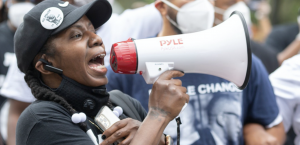The task force, led by Mann and Kiki Jamieson, president of The Fund for New Jersey, was comprised of eight SPIA juniors and two senior commissioners that helped students conceptualize their topics, brainstorm, and plan and practice their verbal presentations.
“This was an unusual task force in several respects,” Jamieson said. “Rather than a lawmaker or executive branch official, our client was a statewide coalition of racial justice advocacy organizations. Rather than a narrow deep dive, our focus on reparations brought multiple topics to the forefront and explored the intersections and interstices. Rather than a technocratic approach, the subject demanded that students combine worldmaking vision with practical political analysis, including fiscal estimates and focus on implementation. Rather than consulting a niche of literature or credentialed experts alone, the students incorporated investigation of the viewpoints, interests, and analyses of community members and their lived experiences.”
The task force engaged with New Jersey Assemblywoman Shavonda Sumpter, sponsor of a bill to create a reparations task force in the state, and Brandon McKoy of the Center on Budget and Policy Priorities, among other notable individuals throughout the process. The team also looked at historical reparation efforts, many of which were successful, including those directed at Japanese Americans who were imprisoned in internment camps during World War II, descendants of Holocaust victims and survivors who demanded accountability from Germany and Austria, and indigenous communities that sued Canada for decades of human rights violations.
“The complex subject matter required the students to work closely together, negotiating both the areas of overlapping interest — including child welfare, education, criminal legal system, environment and infrastructure, and public finance — and the areas of competing priorities,” Jamieson said.
Mann added, “In-class speakers such as Jean-Pierre Brutus of the New Jersey Institute for Social Justice, which recently announced the formation of the New Jersey Reparations Council, which will explore the dimensions of reparations, including the issues our SPIA task force investigated, were critical to support students framing their research and understanding both the opportunities and constraints of public policy formation.”
Those in attendance at Princeton’s Prospect House to listen to the task force’s findings included representatives from United Black Agenda, The Reverend Eric Dobson of Fair Share Housing Center, The Reverend Charles Boyer of Salvation and Social Justice, Marleina Ubel of New Jersey Policy Perspective, and Tennyson Donyéa, statehouse reporter for WHYY/PBS.
“As the granddaughter of a refugee and victim from Nazi-occupied Europe, this experience has affirmed for me in a very personal way that governments can and should take action to reckon with past harms they have perpetrated against whole categories of people,” Mann said.




